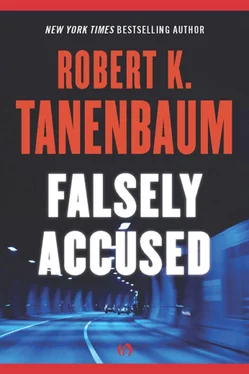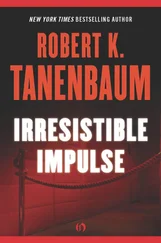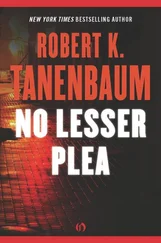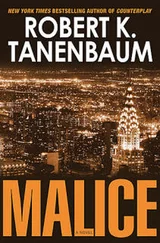Robert Tanenbaum - Falsely Accused
Здесь есть возможность читать онлайн «Robert Tanenbaum - Falsely Accused» весь текст электронной книги совершенно бесплатно (целиком полную версию без сокращений). В некоторых случаях можно слушать аудио, скачать через торрент в формате fb2 и присутствует краткое содержание. Год выпуска: 2010, Издательство: Open Road Integrated Media, Жанр: Криминальный детектив, на английском языке. Описание произведения, (предисловие) а так же отзывы посетителей доступны на портале библиотеки ЛибКат.
- Название:Falsely Accused
- Автор:
- Издательство:Open Road Integrated Media
- Жанр:
- Год:2010
- ISBN:нет данных
- Рейтинг книги:5 / 5. Голосов: 1
-
Избранное:Добавить в избранное
- Отзывы:
-
Ваша оценка:
- 100
- 1
- 2
- 3
- 4
- 5
Falsely Accused: краткое содержание, описание и аннотация
Предлагаем к чтению аннотацию, описание, краткое содержание или предисловие (зависит от того, что написал сам автор книги «Falsely Accused»). Если вы не нашли необходимую информацию о книге — напишите в комментариях, мы постараемся отыскать её.
Falsely Accused — читать онлайн бесплатно полную книгу (весь текст) целиком
Ниже представлен текст книги, разбитый по страницам. Система сохранения места последней прочитанной страницы, позволяет с удобством читать онлайн бесплатно книгу «Falsely Accused», без необходимости каждый раз заново искать на чём Вы остановились. Поставьте закладку, и сможете в любой момент перейти на страницу, на которой закончили чтение.
Интервал:
Закладка:
Karp looked up from the papers he had spread on his lap and the couch around him, his face lit oddly by the muted television. He took in Marlene’s costume and shook his head. “You forgot the cape,” he said.
She stuck her tongue out at him and left. As soon as she was on the stairs she felt the familiar sense of release, the tingling in her limbs, the expansion of her lungs, that she had felt when, as a proper Catholic schoolgirl in Queens she had climbed out her bedroom window at night to meet bad boys.
Of course, she was not meeting a boy now, or a lover of any age. It would never have occurred to Marlene to violate her marriage vows-well, occurred, yes, but not actually to follow through. And in the old days, what she had been after down the family drainpipe was not precisely sex, although that was fascinating, but risk. And not merely risk, because she had never been one for simple daredevilry. She had no interest in say, skydiving, or motorcycle racing. No, it had to be prohibited risk, risk in the teeth of decent expectations.
It had started, really, at age twelve, she reflected on the stairway, when an aunt had escorted her and a group of cousins to the famous off-Broadway production of Threepenny Opera. By the end of the show, St. Teresa of Avila had been eclipsed by Pirate Jenny as Marlene’s ideal of womanhood. She had purchased the cast recording, and then the German version, and for the next few months she made everyone around her sick of Brecht and Weill. She found herself now humming Jenny’s song about the pirate ship and then, as she reached the last landing, singing the chorus in a loud voice with a fairly accurate Lotte Lenya accent.
She laughed to herself, thinking that it had worked out more literally than she might have liked. She could wear a pirate’s patch for real now, and had the letter bomb that destroyed her eye and maimed her hand been a little more powerful, she might have been sporting an actual hook.
She let the big steel door slam behind her and walked out onto the damp and chilly street. There she paused, sucking in the night through flared nostrils. Marlene had long since given up the hope of leading a life that made conventional sense, settling instead for one with two irreconcilable but complementary modes: the Good Mom Desperado, not, she thought, a character much to be seen in opera. Or life. A woman must have everything -that was also a line from a song, she thought, as it flashed through her head. Joni Mitchell. I’m trying to, she thought.
Marlene made her way up Grand to Paglia’s restaurant. When she had first moved to this neighborhood, the place had on most nights been full of local Italians and cops from the old police headquarters down the street. Now it had become SoHo-ized, like most of the places in the area. There was a maitre d’ and a line of elegant couples waiting for seats. Marlene pushed past these to the bar, where she found Harry Bello waiting, staring blankly at a club soda.
Marlene sat on a stool beside him and ordered the same, wishing, not for the first time, that fetuses enjoyed booze. When it came, she finished it in a few gulps and said, “You up for this?”
Harry ignored the question. “He’s out.”
“Driving?”
“Eating. A Spanish joint on C.”
“You know where his car’s at?”
Harry nodded.
They paid and left. On impulse Marlene swiped a big white chrysanthemum from the large vase in the restaurant’s entranceway.
They waited in Harry’s old Plymouth and watched Rob Pruitt walk down Seventh Street to where he’d parked his blue Dodge. He got in and cranked it up and drove off.
“What do you figure, a quarter mile?” asked Bello.
“Maybe less, but after it happens he’ll probably futz around for a while trying to fix it. Let’s go.”
They left the car and entered a tenement building. Pruitt lived in the front apartment on the third floor. Harry picked the lock in two minutes, and they went in.
The apartment was simply furnished and remarkably clean and neat. Pruitt had obviously patronized several of the many used- and unpainted-furniture stores in the neighborhood. He owned a gold velvet easy chair and a scarred thirteen-inch TV on a battered tin stand, and a table, chairs, and chest of drawers in unpainted pine. He slept on a box spring and mattress, neatly made up with gray military surplus blankets. The closet and drawers held an odd combination of worn work clothes and brand-new dressy casuals, many with the store labels still attached. Like the furniture, these last were clearly purchased from shops in the immediate area: colored silk shirts, stiff leisure suits, and the tan leather jacket Carrie had described, clothing suitable for a visit to one of the local salsa clubs. Pruitt was good at taking on the local coloration.
In the bedroom also, Marlene’s flashlight picked up a corkboard, covering nearly an entire wall, on which was arranged a photographic homage to Carrie Lanin: yellowed and faded clippings from student newspapers, showing her cheerleading and prom queening; some pages neatly cut from the same high school yearbook Marlene had already seen, ditto; a wedding photograph (sans groom); an 8 x 10 glossy high school photo in cap and gown. There were also a dozen or so recent photographs, candids obviously, of Carrie on the street. Pruitt had some skill with a camera.
Harry came up behind her and took in the scene. He shone his light on the top of the chest beneath the corkboard. There were two candles in red glass containers, bought at a local botanica, flanking a little museum of Carrieana. Some keys. A pair of blue lace panties. A lipstick. A receipt from Elaine’s.
“Her place,” said Harry, pointing his penlight at the keys.
“Yeah. He must have taken an impression of her keys during their date. Maybe she went to the ladies’ and he waxed them. Once he had a set, he could visit whenever he wanted, and he took souvenirs. Okay, let’s make a donation to the shrine.”
She removed from her pocket the empty Karo corn syrup bottle whose contents she had poured into Pruitt’s gas tank. The syrup was at this moment (she trusted) turning to hard candy in the cylinders of his car. She placed the bottle on the bureau and stuck the mum from Paglia’s in it. Then, using the bedroom window as a mirror, she applied the lipstick to her mouth, removed one of the photos from the board and planted a red kiss on the back of it. She took a ballpoint from her pocket, wrote a short message in neat block letters, and propped the photo up against the bottle.
“What did you write?” asked Harry when they were back in the Plymouth.
“Forget her! Come to me, my darling. Only I love you as you deserve.”
He gave her a complex look, which from long experience she could read: a blend of doubt and worry. It also meant that Bello had fathomed what she was up to.
“It’ll work, Harry.”
He was silent for a moment and then he said, not as a question, “You’re going to have to take a shot.”
“Yeah, I know,” she agreed. “But I can’t think of another way.”
SIX
Moore’s Bar and Grill is on Lexington Avenue between 119th and 120th streets, right around the corner from the Twenty-fifth Precinct, which occupies a four-story building on 119th. Moore’s is a cop bar, owned by an ex-cop and patronized almost exclusively by cops. There is at least one like it a short walk from each of the City’s station houses. At a quarter of four in the afternoon the place is usually jammed and noisy with the day shift taking off and the swing shift getting up attitude before starting work.
Ariadne Stupenagel chose this time to make her entrance. She was wearing tight red jeans jammed into black and silver cowboy boots with two-inch heels, and a pale gray silk blouse. Over this she wore a Soviet military greatcoat with colonel’s pips and blue KGB flashes on the shoulder boards. She carried a stained khaki haversack that had once held a medical kit. The loud male hubbub in Moore’s diminished perceptibly as she passed through.
Читать дальшеИнтервал:
Закладка:
Похожие книги на «Falsely Accused»
Представляем Вашему вниманию похожие книги на «Falsely Accused» списком для выбора. Мы отобрали схожую по названию и смыслу литературу в надежде предоставить читателям больше вариантов отыскать новые, интересные, ещё непрочитанные произведения.
Обсуждение, отзывы о книге «Falsely Accused» и просто собственные мнения читателей. Оставьте ваши комментарии, напишите, что Вы думаете о произведении, его смысле или главных героях. Укажите что конкретно понравилось, а что нет, и почему Вы так считаете.












